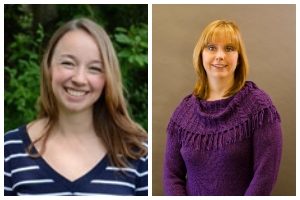Malone University Nursing faculty receive funding to fill the gap

Carrie Stroup ’99, director of the BSN program, and Lori Cooke, clinical instructor of nursing, are both recipients of the Health Resources and Services Administration (HRSA) Nurse Faculty Loan Program Grant through Carlow University where they are completing doctorate programs. The grant is designed to encourage graduate nurses to transition into academic roles upon completion of their degrees in response to the growing nursing faculty shortage. Grant monies allow for up to 85% forgiveness of student loans for nurses working in nurse education environments (schools or acute care settings) for four years post-graduation.
“Nursing education is evolving and the need for faculty is great,” said Cooke. “Clinical expertise, leadership skills, and application of research to bedside care are being recognized as qualities necessary to move nursing into the future, and improve patient outcomes.”
According to the American Association of Colleges of Nursing (AACN), nursing schools in the United States turned away more than 64,000 qualified applicants from baccalaureate and graduate nursing programs in 2016 due to an insufficient number of faculty, clinical sites, classroom space, clinical preceptors, and budget constraints.
“The impact of the baby boomer generation on the healthcare system increases the demand for nurses around the country and current faculty are reaching retirement age,” said Cooke. “We want to encourage our students to pursue advanced degrees if they feel called to teach. The option for this grant was such a blessing because it addresses the financial gap between typical salaries and educational debt.”
With increased demand for nurses and nurse educators comes opportunity for growth and thriving occupational outcomes.
“Teaching in nursing education is fun, complex, and challenging, all at the same time,” said Stroup. “Nursing combines art and science, practice and classroom, personality and protocol. Continuing in doctoral-level education has allowed me to study the topic of clinical judgment in depth. This is particularly important knowing that the NCLEX (nursing licensure exam) will soon change to further evaluate the clinical judgment skills of potential nurses. My work allows me to be proactive in promoting curricular changes to prepare Malone's nursing students for changes in our field.”
